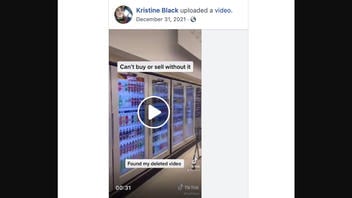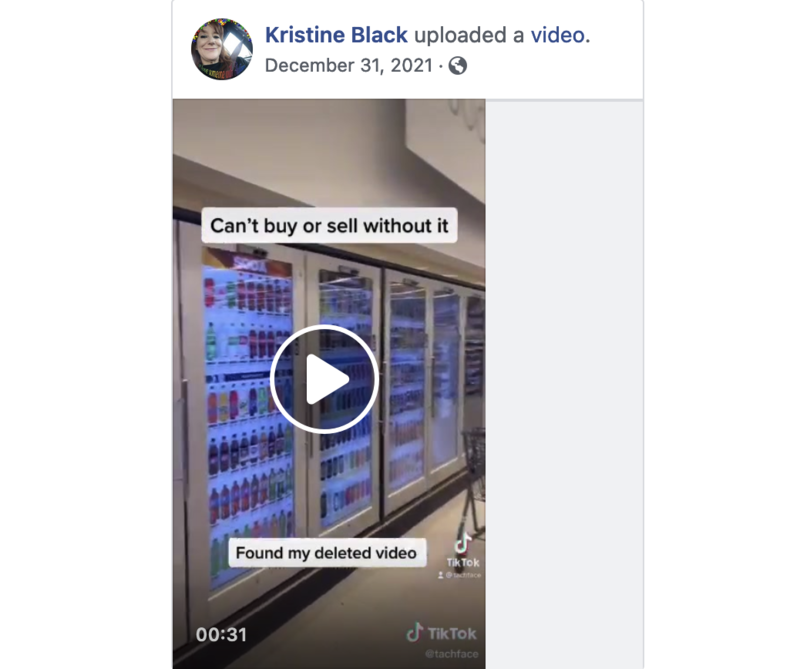
Can these cooler doors read microchips, tattoos or clothing logos that might identify someone as vaccinated or unvaccinated or as a Satan worshipper who wears the "mark of the beast"? No, that's not true: Cooler Screens technology is "identity-blind" and uses optical sensors that recognize age, gender and weather to serve up targeted in-store advertising.
The claim appeared in a Facebook post (archived here) on December 31, 2021, reposted from Tik Tok. Text edited into the video opens:
Can't buy or sell without it
Found my deleted video
The 30-second video begins with a boy recording himself saying:
All right, guys, so I felt it in the holy spirit.
I felt it in the holy spirit to do this video.
I'm here at Walgreens.
Recording what appears to be a row of cooler doors with electronic screens in a Walgreens store, he says:
So they look like normal shelves, but they are not normal shelves.
Every single one of them has infrared scanning sensors right here for your forehead, right?
Mark of the beast on your right hand or your forehead.
Speak to it.
It sees you.
See to wave.
They are made out of super thick metal.
If you don't have the mark, later on, you won't be able to buy or
This is what the Facebook post looked like on January 14, 2022:
(Source: Screenshot taken on Fri Jan 14 13:17:17 2022 UTC)
On its website, Cooler Screens describes the limits and the adaptability of its technology as follows:
Our AI-driven platform allows brands to contextually target consumers as they shop--with stunning 4K creative units that instantly convert to merchandise planograms as shoppers approach--without privacy concerns.
Nothing in Cooler Screens public materials supports the claim that the technology will block who can buy which products. The site contains no confirmation of the "infrared sensors" referred to in the "mark of the beast" video.
A January 11, 2019, Wall Street Journal article compared Cooler Screens technology to an in-store billboard, except it can factor in variable estimates like the age and gender of a consumer and weather:
This new technology could provide brick-and-mortar stores with a marketplace similar to online advertising. Ice cream brands could duke it out to get the most prominent placement when it is 97 degrees outside; an older man could see ads for different products than a younger woman.
Cameras and sensors inside the coolers connected to face-detection technology also can determine which items shoppers picked up or looked at, giving advertisers insight into whether their on-screen promotions worked--and can let a retailer know quickly if a product has gone out of stock.
A January 25, 2019 article by The Atlantic concluded that Cooler Screens technology could not breach specific privacy measures without breaking the law, stating:
First, the camera takes their picture, which an AI system will measure and analyze, say, the width of someone's eyes, the distance between their lips and nose, and other micro measurements. From there, the system can estimate if the person who opened the door is, say, a woman in her early 20s or a male in his late 50s. It's analysis, not recognition.
The distinction between the two is very important. In Illinois, facial recognition in public is outlawed under BIPA, the Biometric Privacy Act.
The "mark of the beast" referred to in the video is a biblical reference to a prophecy that one day followers of Satan will brand or otherwise mark themselves to be readily identified.
Lead Stories reached out to Walgreens and Cooler Screens concerning the validity of this claim. We will update this story if a response is received.


















